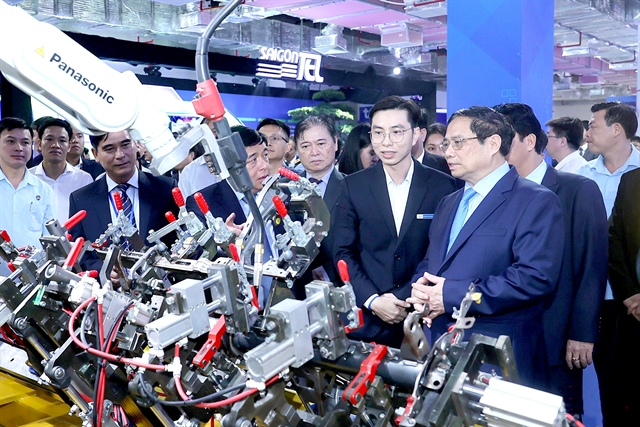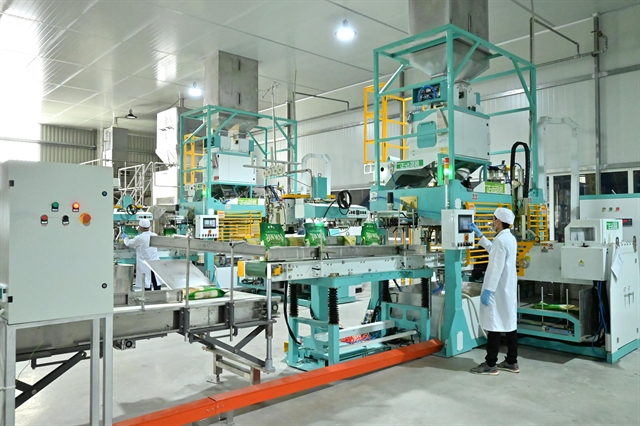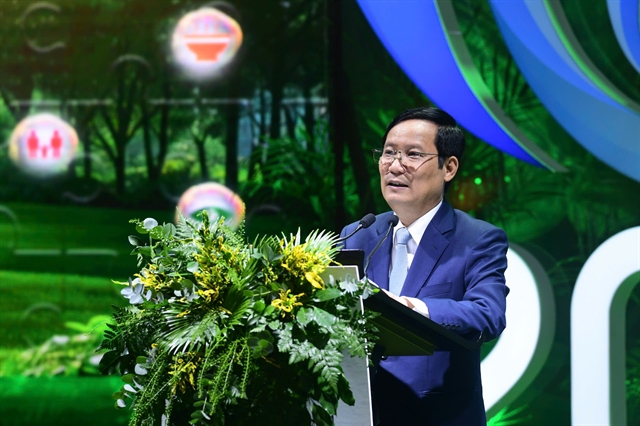 Economy
Economy

 |
| Vinarice Factory of PAN Group harnesses solar energy. Việt Nam commits to reducing greenhouse gas emissions and combating global warming. — Photo courtesy of PAN Group |
Vũ Hoa
HÀ NỘI — Sustainable development is now a critical and unavoidable trend for the business community. This urgency is underscored by growing consumer demand for sustainability, as individuals increasingly prioritise products from environmentally responsible companies.
This statement was heard at the Việt Nam Corporate Sustainability Forum (VCSF) 2024 themed 'Net Zero 2050: Nurturing Trust Creating Transformation' held in Hà Nội on Tuesday.
 |
| Phạm Tấn Công, chairman of the Việt Nam Chamber of Commerce and Industry, delivered a speech at the forum. — Photo courtesy of VCCI |
“Now more than ever, combating global warming and advancing sustainable development have become urgent global priorities. In this context, sustainability is not just a goal but a strategic necessity for all businesses today,” said Phạm Tấn Công, chairman of Việt Nam Chamber of Commerce and Industry (VCCI).
Công mentioned the biggest super typhoon to hit the country in the past three decades that is still affecting much of the North. Typhoon Yagi brought terrible destruction in level, intensity and scope, with record high flood waters. The natural disaster has caused enormous damage to the people and the business community. Preliminary statistics from business associations in the Red River Delta show that the damage to businesses has reached thousands of billions of Vietnamese đồng.
“Typhoon Yagi is a testament to the fact that global warming and climate change have caused increasingly extreme weather events that seriously impact human survival,” he said, adding that now more than ever, sustainable development and the effort to slow global warming have become urgent global priorities.
Việt Nam, as a responsible nation, has committed to actively pursuing efforts to reduce greenhouse gas emissions, the primary driver of global warming. The Party and State, with the full support of the political system, have established two key roadmaps for sustainable development: adapting to climate change and building resilience, as well as mitigating impacts of climate change by decarbonising the growth process. This includes implementing a phased approach to reduce emissions and transitioning the economy away from carbon-intensive energy sources, with the goal of achieving net-zero emissions by 2050.
To successfully execute these roadmaps, the VCCI leader underscored the crucial role of the business community. “Building this belief is essential. It will generate strong momentum for comprehensive transformation: shifting awareness, changing mindsets and driving action. We are confident that, with the collective support of the entire political system, the business community's green transformation efforts will succeed,” he said.
Sustainability: a driver of value creation
At the forum, it was noted that the journey toward green transformation and achieving net zero by 2050 presents significant challenges, particularly for developing countries like Việt Nam. These concerns about reaching net zero are both valid and understandable.
To build confidence and ensure the successful implementation of net zero goals, a comprehensive transformation is needed - one that spans from awareness to action. This requires co-ordinated efforts from the Government, regulatory agencies, businesses, investors, consumers and other stakeholders.
Binu Jacob, General Director of Nestlé Vietnam and Co-Chairman of the Việt Nam Business Council for Sustainable Development (VBCSD), said: “Sustainability should be viewed as a driving force for value creation rather than a burden for businesses. While the green transformation process involves various challenges and bottlenecks, one major issue is aligning sustainability efforts with core decision-making drivers for brand selection."
"Therefore, businesses must adapt their strategies and engage with consumers to make sustainable initiatives a key factor in value creation. Additionally, strengthening multi-stakeholder collaboration through platforms like the VCSF Forum is crucial for effectively advancing the green transformation and fulfilling net zero commitments,” Jacob said.
Sustainability and profitability aren't opposing forces; they are two sides of the same equation. You can’t have one without the other. For businesses, a major challenge in the transformation process is linking sustainability to the core motivations behind consumer brand choices. Companies need to shift their approach and connect with consumers by understanding their behaviours, needs and preferences. This way, sustainability initiatives can become genuine drivers of value, he added.
As one of leading agricultural and food group with 12 years of experience in sustainable development, Nguyễn Trà My, general director of PAN Group, shared the key to a business's longevity and growth: staying committed to sustainable development. Leaders play a crucial role in this commitment, requiring a clear understanding of the role of sustainability.
To ensure effective implementation, PAN Group has established a Sustainable Development Steering Committee, chaired by the General Director. This committee includes leaders from all three core business areas - agriculture, aquaculture and food processing - who are responsible for proposing strategies and frameworks to integrate sustainable practices.
She highlighted PAN’s dedication to quality, noting that sustainable development is ingrained in the company's ethos and is essential for its long-term survival.
“We are committed to elevating Vietnamese agriculture, with quality as our top priority. This commitment extends beyond PAN to the entire agricultural sector and is a point of national pride. The mission is ambitious, and the challenges are significant, requiring daily efforts from PAN Group,” she said.
In discussing the green transformation through diversity and inclusion, Milly Cheng, General Director of Coca-Cola Vietnam, described the company's sustainable development strategy, 'Our choice, our future,' which revolves around three main pillars: products, planet and people. This strategy serves as a guide for Coca-Cola Vietnam's long-term development.
With nearly a decade of community support through the EkoCenter project, Coca-Cola Vietnam has continually innovated to build resilient communities in the digital age. Their initiatives include STEAM education programmes, e-commerce training, circular economy solutions and climate change mitigation efforts, all carried out at Coca-Cola Community Support Centres across the country. — VNS




